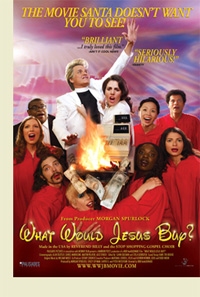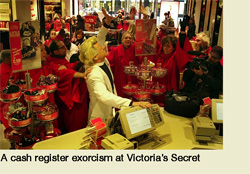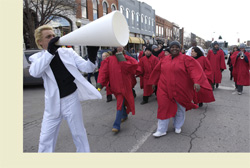Do
I Hear a Changelujah?: Reverand Billy and the Church of Stop Shopping
Of
all the ways to re-imagine progressive politics in our age of fantasy, Reverend
Billy and the Church of Stop Shopping is far and away my favorite.
Billy,
the leader of a New York-based anti-mall, anti-big-box congregation
is on a mission to save souls from the Shopocalypse by preaching
a small-is-beautiful sermon inside real life retail environments.
Times Square, Walmart, Victoria’s Secret, America’s
Mall, Starbucks and even Disneyland, rat hole to the culture of
consumption’s anti-Christ, Mickey Mouse, have all experienced
this Church's presence firsthand. Since 1999, the good reverend
activist has used the spectacular vernacular of TBN evangelists
to deliver a message usually reserved for the sober writings of Thorstein
Veblen and Benjamin
Barber.
 Changelujah!
Amen. Changelujah!
Amen.
Spreading
the word of radical economic reform, Reverend Billy has sermonized
his way from the subways and streets of New York onto the big screen
in a new documentary, What Would
Jesus Buy? Produced
by Morgan
Spurlock and directed by Rob
VanAlkemade, the film follows Billy on a cross-country mission “to
save Christmas from over-consumption and the fires of eternal debt.”
What
is this Shopocalypse the right reverend speaks of? “Shopping
plus Apocalypse,” Savitri
D, Billy’s wife and the Director of the Church of Stop
Shopping tells me. “You can just look out your window, wherever
you are, and see it all around.”
Outside
my window, the malls of Orange County, California are adorned for
a retail feeding-frenzy in hopes that Saint Nicholas’ followers'
credit line will soon be there. Bentleys, Beamers, and Acuras tied
with three-foot wide bows line the glittering brand-filled promenades,
like north stars of sinful spending.
Billy
sees through this happy holiday crap. “You don’t need
to buy a gift to give a gift,” he says. Amen to that.
Believers
in the Stop Shopping School of Divinity know that the current American
consumer economy will eventually kill us all, if not literally,
than spiritually. Our sweatshop driven, clear-cutting, globally
warmed, toxically wasted, monolithic big box manufacturer of needs
Version 10.0 destroys lives, souls and imaginations.
Halfway
through What Would Jesus Buy? Billy
and the choir in the midst of hallelujahs and shouts for joy are
approached by security in a Walmart parking lot. They are asked
to leave. “We’re in church here,” Billy says.
The
security guard looks mystified. Church? Where? What is this? Who
are you? A reverend? An organizer? A performance artist? A new wave
progressive? What just happened here?
Reverend
Billy is the embodiment of NYU
Gallatin School Professor Stephen
Duncombe's prescient book, Dream:
Re-imagining Progressive Politics in the Age of Fantasy. Duncombe
proposes that popular fantasy — corporate theme parks, ad
campaigns, video games, celebrity culture, Las Vegas — can
help progressives define and make possible a new political future.
Billy’s
fantasy captures the public imagination — a marked change
from what Duncombe took part in for 15 years in the 1980s and early
90s.
 “We
were organizing political demonstrations or organizations that we
ourselves were not too enthusiastic about,” Duncombe tells
me. “We’d follow a model for a protest that went something
like this: You tell people where to show up. You negotiate with
the police where you’re going to march. You march there. Then
you get to a place at the end and you stand around and listen to
some people tell you what you already know. And then you go home
or maybe you go to a preordained arrest area and get arrested. I
had done this for fifteen years and I couldn’t do it anymore.” “We
were organizing political demonstrations or organizations that we
ourselves were not too enthusiastic about,” Duncombe tells
me. “We’d follow a model for a protest that went something
like this: You tell people where to show up. You negotiate with
the police where you’re going to march. You march there. Then
you get to a place at the end and you stand around and listen to
some people tell you what you already know. And then you go home
or maybe you go to a preordained arrest area and get arrested. I
had done this for fifteen years and I couldn’t do it anymore.”
To
remedy these antiquated protests, Duncombe calls for progressives
to “build a politic that embraces the dreams of people and
fashion spectacles that give those dreams form."
Billy's
dream is built on the foundation of mainstream America’s most
curious religious act of flamboyance: the born again televangelist.
But while traditional preachers aim fire and brimstone at human
differences, Billy targets the sins of overconsumption.
—
In
the late 1990s, Bill Talen hitchhiked to New York City only to discover,
to his great disenchantment, that Times Square had became a Disney
shopping mall. Inspired by sidewalk preachers, he bought a collar,
bleached his hair and became the Reverend of the Church of Stop
Shopping.
Savitri
D remembers the first time she saw Billy deliver a sermon from a
portable pulpit he carried with him.
“I
felt there was something really nervy about it,” she says “What
I liked about it is that it’s sort of unstable. You can’t
quite figure out what it is. I still have that feeling about it.
I think he created that character out of a lot of impulse and intuition.”
 “Preaching
is an incredible instrument,” Savitri continues, “We
call it the crack between singing and talking. It’s finding
the nuance of message delivery. Ultimately when you’re making
a political statement, you have to deliver meaning. The instrument
can overwhelm the meaning. We ride a line between irony and sincerity.
We’re making a joke all the time about right wing preachers.
But we take it all very seriously and, in a sense, we have created
a faith. All these people in the choir, they mean it. It’s
not like were just acting like we mean it. We mean it.” “Preaching
is an incredible instrument,” Savitri continues, “We
call it the crack between singing and talking. It’s finding
the nuance of message delivery. Ultimately when you’re making
a political statement, you have to deliver meaning. The instrument
can overwhelm the meaning. We ride a line between irony and sincerity.
We’re making a joke all the time about right wing preachers.
But we take it all very seriously and, in a sense, we have created
a faith. All these people in the choir, they mean it. It’s
not like were just acting like we mean it. We mean it.”
Changelujah,
children!
Rob
VanAlkemade, the director of “What Would Jesus Buy?” was
working on a short documentary about the 2004 Republican Convention
when he first saw Billy. “I would consistently bump into
the Church of Stop Shopping doing cash register exorcisms, or singing
in a sound-byte march down the street, or officiating illegal weddings
in Central Park and it became a spiritual renewal when I’d
come across them. Eventually we felt drawn together and I ended
up being invited on a ten-day tour across California — the Stop
Big Boxes Tour of 2004.”
The
footage VanAlkemade shot on that tour became Preacher
with an Unknown God, a short documentary that went on to
win Honorable Mention at the 2006 Sundance Film Festival. By that
time VanAlkemade was already working with producer Morgan Spurlock,
of Super Size
Mefame, on a new project that would become What Would
Jesus Buy?
How
are the results of this new wave progressive approach different
from the old school results? Isn’t this new documentary and
the new wave progressive activism it represents just preaching to
the choir? Apparently not.
“It’s
very surprising to us how well the film has been received across
the political and religious spectrum,” VanAlkemade says. “American
Families Association President Tim
Wildmon loved the film.”
This
is the same Tim
Wildmon who reported on
his conservative radio show in 2005 that liberals “don't have
the kind of family responsibilities that most people have, and certainly
not church responsibilities.”
 Since
then Wildmon has seen the light, at least on the silver screen.
Alkemade has shown Preacher
with an Unknown God and What
Would Jesus Buy? at Christian festivals to receptive audiences. “We
found common ground with folks that it’s not always easy to
find common ground with,” Alkemade says. “It’s
very encouraging that we’re not going to be preaching to the
choir.” Since
then Wildmon has seen the light, at least on the silver screen.
Alkemade has shown Preacher
with an Unknown God and What
Would Jesus Buy? at Christian festivals to receptive audiences. “We
found common ground with folks that it’s not always easy to
find common ground with,” Alkemade says. “It’s
very encouraging that we’re not going to be preaching to the
choir.”
“We’re
trying to reach across the divide in this country, Savitri chimes
in. “There’s been a tremendous amount of polarity the
last 10 years. It’s keeping us from changing. It’s keeping
us from making real progress in our culture.”
In What
Would Jesus Buy? — right before the climactic scene
in which the good Reverend and the Church Choir slip stealthily
into Disneyland’s Mainstreet USA parade — Billy is
asked to baptize an infant in a retail center parking lot.
“We
ask the fabulous creator, the mother-father god that is not a product,
to come into the soul of this blessed baby," Billy says looking
to the heavens as the choir croons “amen." "Give
this child and give its parents the loving power not to be lost
to the mindlessness of consumerism.”
The
Choir sings the baby’s name. “Roxanne Elisabeth. Roxanne
Elisabeth. Bless this child.”
“The
manager wants you to leave,” security says.
“We
just baptized a baby. Did you see that?”
Yes
we did. Billy has hit a nerve. The timing is right. Mainstream America
has grown weary of leaders who tell us it’s time to shop.
It’s
time to stop. It's time for us to find a place in Reverend Billy’s
politics of redemption, love, joy, hope, release and ecstasy.
What
would Jesus buy?
Not
much. We’re in church, here.
— Nathan
Callahan, November 16, 2007
|